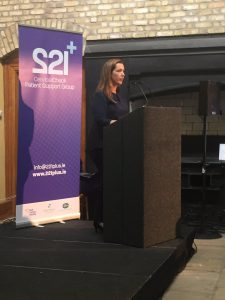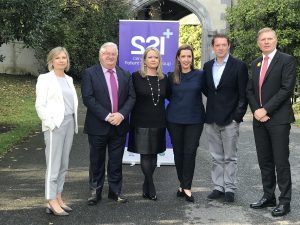Marie Keating Foundation helps to launch the 221+ CervicalCheck Patient Support Group
The group, co-founded by Vicky Phelan, Stephen Teap, Lorraine Walsh, the Marie Keating Foundation, the Irish Cancer Society and the Irish Patient Association, aims to support and advocate on behalf of the women and families affected by the CervicalCheck scandal.
The 221+ CervicalCheck Patient Support Group was formally launched in Farmleigh on Sunday 14th October 2018.
Commenting at the launch, CEO of the Marie Keating Foundation, Liz Yeates says “we are privileged to play our part in co-founding this group and we hope that 221+ will bring much needed healing to all the women and families affected by the CervicalCheck scandal. The courage and determination of Vicky Phelan, Stephen Teap and Lorraine Walsh to establish this group is commendable and they are true advocates for all who have been directly impacted. The recent tragic passing of Emma Mhic Mhathúna reminds us all just how badly these women have been let down and treated. The establishment of this group is a much-needed positive step forward to help support the women and their loved ones affected by this scandal.”
group and we hope that 221+ will bring much needed healing to all the women and families affected by the CervicalCheck scandal. The courage and determination of Vicky Phelan, Stephen Teap and Lorraine Walsh to establish this group is commendable and they are true advocates for all who have been directly impacted. The recent tragic passing of Emma Mhic Mhathúna reminds us all just how badly these women have been let down and treated. The establishment of this group is a much-needed positive step forward to help support the women and their loved ones affected by this scandal.”
The group was established by Vicky Phelan, Stephen Teap and Lorraine Walsh, in conjunction with the Marie Keating Foundation, Irish Cancer Society and Irish Patients Association. It will be funded by the Department of Health but will operate entirely independently of the HSE.
The 221+ CervicalCheck Patient Support Group will provide expertise and advice to women in relation to a range of relevant topics including information on clinical trials, new and emerging treatment options including immunotherapy drugs. It will act as an inclusive voice for all affected by the current crisis but will also aim to give voice to other women diagnosed with cervical cancer in the future as a result of the screening issues.
Relevant information and resources will be made available to 221+ members through a website (www.221plus.ie), which will contain some public information on the group as well as a closed members’ portal, which can be accessed with a unique access code. This portal will also facilitate an ‘Ask the Specialist’ service whereby members can send any queries or questions in confidence, and a response will be given within a defined period.
Speaking at the launch Vicky Phelan said, “The CervicalCheck scandal has been traumatic for the 221+ patients and their families. Part of the process in healing from trauma is connecting with others who have been affected. One of the main functions of the 221+ Patient Support Group is to provide a safe, open, caring, supportive environment to allow this healing to take place.”

Also speaking at the launch Lorraine Walsh said, “The day I found out I had cancer was what I thought was the worst day of my life! I was wrong; the day I found out that I shouldn’t have got cancer had my smear been read properly was the worst day of my life! I am now riddled every day with the awful thoughts of “what if?” which has shaken me to my very core and challenged me mentally and emotionally beyond any physical or emotional challenges that I ever experienced before. The support that I have received from the fellow women and families involved in this disaster has been so comforting and today we launch our official support group 221+ so we can continue to support each other through this very difficult time, it is soothing to be among people that understand my heartache as they are dealing with their own pain.”
Stephen Teap, who lost his wife Irene to cervical cancer, said, “Not one of us wants to be a part of this scandal, none of us asked for this nor would we of ever agreed to be a part of this, but we are. While some of us have gone public to take this crisis head on there are many others suffering in silence in the background. One of the main purposes of this support group is reaching out to everyone involved in this, to let them know they’re not alone, offer them support and help in an environment they can fully trust and stand shoulder to shoulder with them while taking the steps together to see this out.”

